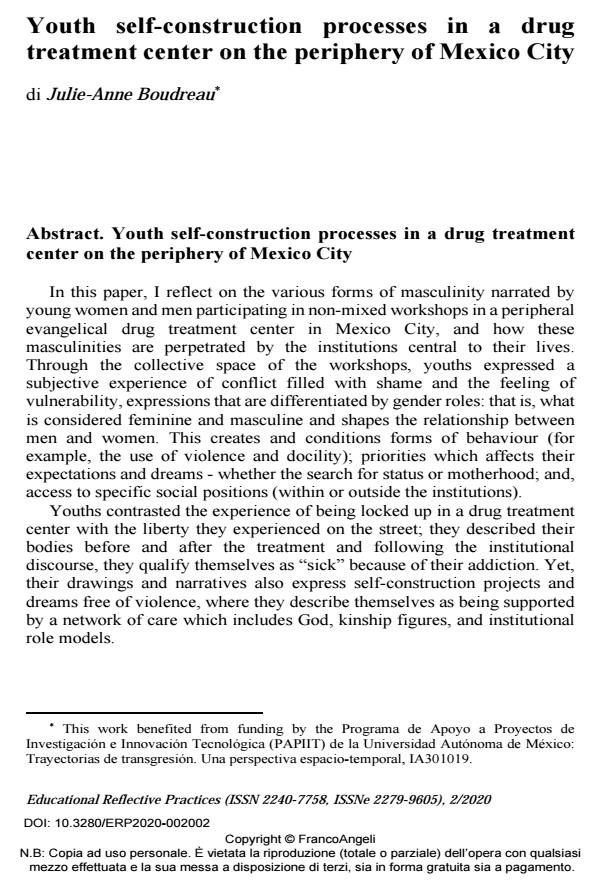Youth self-construction processes in a drug treatment center on the periphery of Mexico City
Titolo Rivista EDUCATIONAL REFLECTIVE PRACTICES
Autori/Curatori Julie-Anne Boudreau
Anno di pubblicazione 2021 Fascicolo 2020/2 Lingua Inglese
Numero pagine 17 P. 37-53 Dimensione file 2141 KB
DOI 10.3280/ERP2020-002002
Il DOI è il codice a barre della proprietà intellettuale: per saperne di più
clicca qui
Qui sotto puoi vedere in anteprima la prima pagina di questo articolo.
Se questo articolo ti interessa, lo puoi acquistare (e scaricare in formato pdf) seguendo le facili indicazioni per acquistare il download credit. Acquista Download Credits per scaricare questo Articolo in formato PDF

FrancoAngeli è membro della Publishers International Linking Association, Inc (PILA)associazione indipendente e non profit per facilitare (attraverso i servizi tecnologici implementati da CrossRef.org) l’accesso degli studiosi ai contenuti digitali nelle pubblicazioni professionali e scientifiche
In this paper, I reflect on the various forms of masculinity narrated by young women and men participating in non-mixed workshops in a peripheral evangelical drug treatment center in Mexico City, and how these masculinities are perpetrated by the institutions central to their lives. Through the collective space of the workshops, youths expressed a subjective experience of conflict filled with shame and the feeling of vulnerability, expressions that are differentiated by gender roles: that is, what is considered feminine and masculine and shapes the relationship between men and women. This creates and conditions forms of behaviour (for example, the use of violence and docility); priorities which affects their expectations and dreams - whether the search for status or motherhood; and, access to specific social positions (within or outside the institutions). Youths contrasted the experience of being locked up in a drug treatment center with the liberty they experienced on the street; they described their bodies before and after the treatment and following the institutional discourse, they qualify themselves as "sick" because of their addiction. Yet, their drawings and narratives also express self-construction projects and dreams free of violence, where they describe themselves as being supported by a network of care which includes God, kinship figures, and institutional role models.
- Becker, H. S. (1963). Outsiders: Studies in the sociology of deviance. New York: Free Press Glencoe.
- Boudreau, J. A. (2017). Global Urban Politics: Informalizaiton of the State. Cambridge: Polity.
- Bourgois, P. (1995). In Search of Respect: Selling Crack in the Barrio. Cambridge: Cambridge University Press.
- Bourgois, P. (2009). Treinta años de retrospectiva etnográfica sobre la violencia en las Américas. In López, J., García, S. B., & Camus, M. (coords.). Guatemala: Violencias Desbordadas. Córdoba: Universidad de Cordoba. Servicio de Publicaciones.
- Butler, J. (1998). Performative acts and gender constitution: an essay in phenomenology and feminist theory. Theatre Journal. 40, 4.
- Butler, J. (2008). Cuerpos que importan. Sobre limites materiales y discursivos del ‘sexo’. Buenos Aires: Paidos.
- Butler, J. (2010). Marcos de guerra: las vidas lloradas. México: Paidos.
- Foucault, M. (1992). Microfísica del poder. Madrid: Editorial La Piqueta.
- Husserl, E. (1912)1989. Ideas pertaining to a Pure Phenomenology and to a Phenomenological Philosophy, Second Book. Trans. Richard Rojcewicz and André Schuwer. Dordrecht and Boston: Kluwer Academic Publishers.
- Scheper Hughes, N. (1992). Death without Weeping. Berkeley. California: University of California Press.
- Viveros Vigoya, M. (2002). De quebradores y cumplidores. Sobre hombres, masculinidades y relaciones de género en Colombia. Colombia: Universidad nacional de Colombia.
- Zamudio Angles, C. A. (2012). Las redes del narcomenudeo. Mexico City: CEAPAC Ediciones.
Julie-Anne Boudreau, Youth self-construction processes in a drug treatment center on the periphery of Mexico City in "EDUCATIONAL REFLECTIVE PRACTICES" 2/2020, pp 37-53, DOI: 10.3280/ERP2020-002002